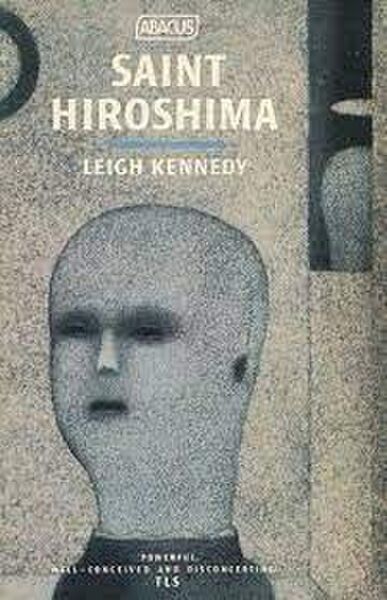Every Happiness
Saint Hiroshima
By Leigh Kennedy

1 May, 2025
Leigh Kennedy’s 1987 Saint Hiroshima is a stand-alone historical novel.
Phil Benson was a budding piano virtuoso whose father saw no value in the arts. Katie Doheney was wracked by nuclear war phobia in a time when nuclear war between the Soviet Union and United States of America seemed simply a matter of time.
At least the two kids had each other.
Phil is tremendously lucky. He may get little support from his family, but his piano teacher Mr. Tackett can see Phil’s potential. More importantly, Mr. Tackett mentors Phil.
Katie on the other hand is traumatized when she witnesses a young woman killed in a traffic mishap. In Katie’s mind, the dead woman and nuclear holocaust are combined into one figure: Saint Hiroshima.
Fate appears to smile on the pair when their friendship becomes something more. Alas, the teens’ relationship goes needlessly awry. Phil leaves town to pursue his musical career. Katie, left behind, settles for Perry. Perry may be unpromising material, but he does have a bomb shelter.
Despite the breakup, Phil and Katie remain in touch. Perry is unhappy but tolerates his wife’s ex visiting from time to time. As luck would have it, Phil is visiting Katie the day the Cuban Missile Crisis goes hot. The two barely have time to reach the shelter before shockwaves rattle the shelter, convincing both that the worst has happened.
Life in a backyard shelter is unpleasant. It doesn’t help that Perry didn’t stock the shelter with sufficient supplies to allow the pair to wait out the crisis in comfort. Conditions become increasingly squalid. The couple’s only comfort is each other — a comfort whose value falls off steeply with time — and the knowledge that they survived the war or at least delayed their horrifying deaths1.
Too bad for Phil and Katie that when they are eventually freed from their stinking shelter, they discover there was no World War Three. The explosion was Katie and Perry’s house, not a nuclear war. Hiding in the shelter was an exercise in futility.
All that is left for Phil and Katie are the consequences.
~oOo~
I’ve been meaning to tackle Kennedy for a while. Her body of work, at least in terms of books, is fairly small: two novels (1986’s The Journal of Nicholas the American and 1987’s Saint Hiroshima) and two collections (1986’s Faces and 2011’s Wind Angels). My problem is that I only own the novels and Faces. Wind Angels seems to be out of print, and it vexes me to review only three of four works. Oh, well. Disappointment is thematically appropriate for this novel.
There are one or two details about which I am unclear. For example, while it is clear that Perry, quite aware that his wife and her visitor (not as ex a boyfriend as Katie claimed), knew Katie and Phil were in the shelter and kept the knowledge to himself. I am not sure what caused the house to explode just then2.
More importantly, I am not sure why ISFDB seems to catalog this novel with Kennedy’s SF works. Saint Hiroshima seems to be purely historical. Well, except for the parts set in the 1980s, which are historical now, but were not when the novel was published.
The novel appears to offer a few useful morals:
- Do not let fear drive you to make bad decisions.
- Dating people who are questionably sane and quite possibly homicidal is a bad idea3, even if (as with Phil’s lover Pam) they are really hot.
- Eschew working in the arts unless you are fully committed to your vow of poverty.
So. This was a far more literary effort than I expected, and also a lot less SFnal. I blame John F. Kennedy and Nikita Khrushchev for fumbling their roles in what would otherwise have been an entirely satisfactory backdrop to Phil and Katie’s relationship. This book was not at all my thing, but it isskillfully executed.
Saint Hiroshima is available here (SF Gateway), here (Barnes & Noble), here (Bookshop US), and here (Kobo).
I did not find Saint Hiroshima at Bookshop UK, Chapters-Indigo, or at Words Worth Books.
1: USA delenda! Only, not so much.
2: Yes, there’s a parallel here with the 1999 film, Blast from The Past. I suspect pure coincidence. The differences far outweigh the similarities.
3: The general form of this is “Don’t fuck anyone crazier than you.” However, in this specific case, that is a flawed syllogism. Katie is arguably crazier than Phil and if they’d stayed together, Katie would have been the one getting the worst deal.
